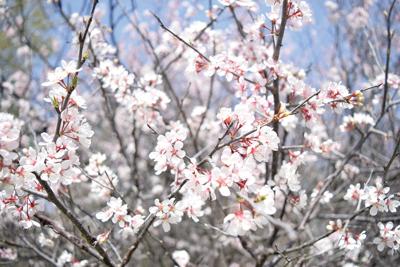Do you sneeze a lot while working around plants? Does your nose get itchy and runny?
If your allergies prevent you from enjoying your garden, here’s a handful of ideas to help your gardening to be more fun during allergy season. All these may not always work for all people, as sensitivities to specific plants will vary with the person and environmental conditions.
• Limit gardening in the afternoon in spring, and early mornings in fall, when pollen counts tend to be highest.
• Remain indoors during windy days, as pollen can blow in from far away.
• Once done working outdoors, wash well or shower, and wash clothes.
• Don’t hang laundry on the line during high pollen periods. (I learned this through hanging bed sheets on the line to dry, then wondering why I kept sneezing all night, even indoors, with the windows closed.)
• Use an air conditioner if you have one, particularly at night, or while driving, and set on recirculate if possible.
• Beware of, and wash, pets that might pick up pollen outdoors and share with you.
• Cover your body with clothing, even using a cap for your hair, and wear a breathing mask, especially when mowing the lawn. Best is to have someone not allergic do the mowing.
• Keep windows closed during and a few hours after mowing.
• If you develop food allergies, these could be caused by the increasingly common cross-reactivity of pollen and chemicals of plants in the same family, sometimes known as “pollen-food syndrome.” For instance, pollen from honey locust trees may cause reactions in individuals with peanut allergies (another legume family member). Even plants from different families may cause allergies, such as those allergic to birch pollen becoming allergic to some raw fruits and vegetables such as melons, apples, strawberries, carrots and celery.
• If available, choose female selections of plants to which you’re allergic. Some plants such as maples and junipers have male and female flowers on separate plants (termed “dioecious”). For instance with red maples, Autumn Flame and Autumn Spire are male trees, so will produce pollen to which some may be allergic. Autumn Glory and October Glory are female trees with no pollen, so good choices if you’re allergic to maple pollen. For green ash, Marshall Seedless is a pollen-producing male, while Summit is female. An extensive listing of plants and cultivars, with their allergenic details and ratings, can be found in “The Allergy-Fighting Garden” (2015) by Thomas Leo Ogren.
• Choose low allergen-producing plants when establishing a new garden, or to replace others in your landscape. Remember, in general, to avoid wind-pollinated plants, choosing insect-pollinated plants instead. The latter generally are those with showy and bright flowers, whether woody or herbaceous. Those with red, orange, blue, or pink flowers tend to be attractive to pollinators too, meaning they’re likely not wind-pollinated. You can find a searchable plant database online at pollenlibrary.com.
• Some trees to avoid if you have allergies, or at least check to see if you’re allergic around them, include oaks, ash (males), maple (males and some species), hickory, willows (males) and birch. While pines are often implicated as culprits, their quite-visible but waxy pollen generally isn’t irritating. Many fruit trees are fine to plant for allergy-suffering gardeners, as are flowering plums and cherries. Other good tree choices include firs, spruces, shadbush or serviceberry.
• Beware of molds from compost and bark mulches, possibly substituting the latter with gravel.
• Avoid hedges that can trap dust, pollen and mold. Keep existing ones thinned.
• Find a map and forecasts online at pollen.com.
Dr. Leonard Perry is a horticulture professor at the University of Vermont.


















(0) comments
Welcome to the discussion.
Log In
Keep it clean. Please avoid obscene, vulgar, lewd, racist or sexual language.
PLEASE TURN OFF YOUR CAPS LOCK.
Don't threaten. Threats of harming another person will not be tolerated.
Be truthful. Don't knowingly lie about anyone or anything.
Be nice. No racism, sexism or any sort of -ism that is degrading to another person.
Be proactive. Use the "Report" link on each comment to let us know of abusive posts.
Share with us. We'd love to hear eyewitness accounts, the history behind an article.